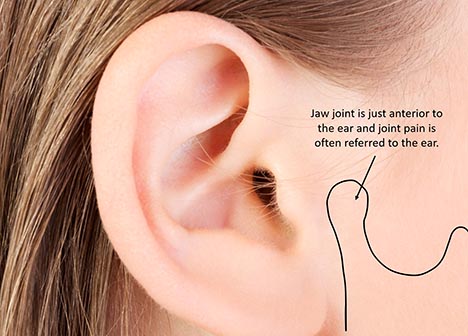
Do you experience frequent TMJ earaches or a constant ringing in your ears that affects your hearing? Does the pain spread to your face, jaw, or neck or cause frequent headaches? Have over-the-counter pain remedies failed to relieve your pain?
While ear infections can cause ear pain, chronic ear pain might be a sign of a far more serious condition known as temporomandibular joint disorder (TMD). This condition, which affects your temporomandibular joints (TMJ), can cause a variety of symptoms. Fortunately, there are several effective treatment options.
What is TMJ Disorder?
Your TMJ joints connect your skull to your jaw on both sides of your face, and they are responsible for all your jaw movements. Every time you talk, chew, or move your jaw side to side, you can thank your TMJs.
When these joints experience excess strain, they can become irritated. If the force and pressure continue, the joints can become misaligned. This can lead to TMJ earaches, as well as other various symptoms, including:
- Ringing in the ears
- Hearing loss
- Jaw pain
- Frequent headaches
- Facial and neck pain
- Popping or clicking when opening the mouth
- Limited range of motion of the jaw
Severe TMD can lead to jaw dislocation, which locks your jaw in a closed or open position. If you experience this, you will need to go to a dentist or emergency room to have your jaw reduced back into place.
 What Causes TMJ Earaches?
What Causes TMJ Earaches?
The most common cause of TMD is clenching your jaw and grinding your teeth, a condition known as bruxism. Since bruxism most often occurs while you are sleeping, many patients are unaware of this habit. But even though it may go unnoticed, it can cause tremendous damage to your teeth and jaw joints.
To get an idea of the amount of damage bruxism can do, consider the force it takes to break a tooth. Patients with bruxism frequently break, chip, and crack not only natural teeth but even stronger restorations. And over time, chronic teeth grinding can wear your teeth down until there is practically nothing left.
That is a lot of force, and that same force is being exerted on your jaw joints, slowly changing your bite. Moreover, broken and worn down teeth also affect your bite, knocking it out of alignment.
Crooked teeth, missing teeth, and a misaligned bite can also cause TMD, so the effects of teeth clenching and grinding on your bite make it that much worse.
And since a misaligned bite is also a common culprit for bruxism, a patient can get into a vicious cycle. A bad bite causes bruxism, which causes TMD, which worsens the bite, which worsens the bruxism, and on and on.
TMJ Treatments to Address Your Earaches
When TMJ pain strikes, many patients believe the best treatment option is to take over-the-counter medications for pain relief. While this can be helpful, it does nothing to address the underlying cause.
The most conservative treatment involves simple things you can do at home. For instance, many people experience bruxism related to anger, fear, or anxiety, and stress management and relaxation techniques can help. In severe cases, some patients benefit from seeking help from a counselor or taking prescription anti-anxieties or muscle relaxants.
You don’t want to worsen your symptoms by overworking your jaw, so you should avoid chewing things, like ice, gum, and pencils Finding ways to relax your jaw joints, such as heat or learning to position the tip of your tongue between your top and bottom teeth, is also helpful.
It is also a good idea to avoid or reduce the consumption of alcohol and foods and drinks with caffeine.
But if your symptoms continue, or if you have already damaged your teeth or jaw joints, it’s a good idea to get help before things get worse. Your dentist can examine you and see if your symptoms require diagnosis and treatment. If treatment is indicated, your dentist will discuss those options with you.
Custom Oral Appliance
If bruxism is more than a mild problem for you, or if you have TMD, your dentist can fit you with a custom-made mouth guard. Worn at night, this dental appliance keeps your teeth apart and relaxes your jaw to eliminate or reduce your sleep-related bruxism. Moreover, it helps reduce tooth sensitivity, jaw pain, and TMJ earaches and can also help control sleep disorders, such as sleep apnea.
Since it is customized to your mouth, it is comfortable and easy to get used to.
Orthodontics
If crooked teeth or a misaligned bite are causing your bruxism and TMD, you may be referred to an orthodontist. Not only will straight teeth improve your symptoms, but they will also make your smile more beautiful. Moreover, straight teeth are easier to keep clean with brushing and flossing, meaning you can enjoy improved oral health.
Restorative Dentistry Options
For patients with damaged, broken, or missing teeth, restorative dentistry treatment can restore a healthy, strong smile.
Extensively damaged teeth may require a root canal, and any weakened or severely worn or broken teeth will need a dental crown.
If the damage is minor to moderate, your dentist can discuss cosmetic bonding and porcelain veneer options.
A dental implant with a crown or fixed bridgework can replace a missing tooth or teeth. But for those with several teeth missing, you may receive a recommendation for partial or complete dentures.
Once your smile is strong and back to full function, your dentist can fit you for a custom nightguard to control bruxism and protect your new teeth.
Don’t Let TMD Interfere With Your Life
TMJ earaches and other symptoms of TMD can interfere with your life and keep you from enjoying it to its fullest. To learn more about TMD treatments, contact Lake Forest Dental Arts.

 What Causes TMJ Earaches?
What Causes TMJ Earaches?